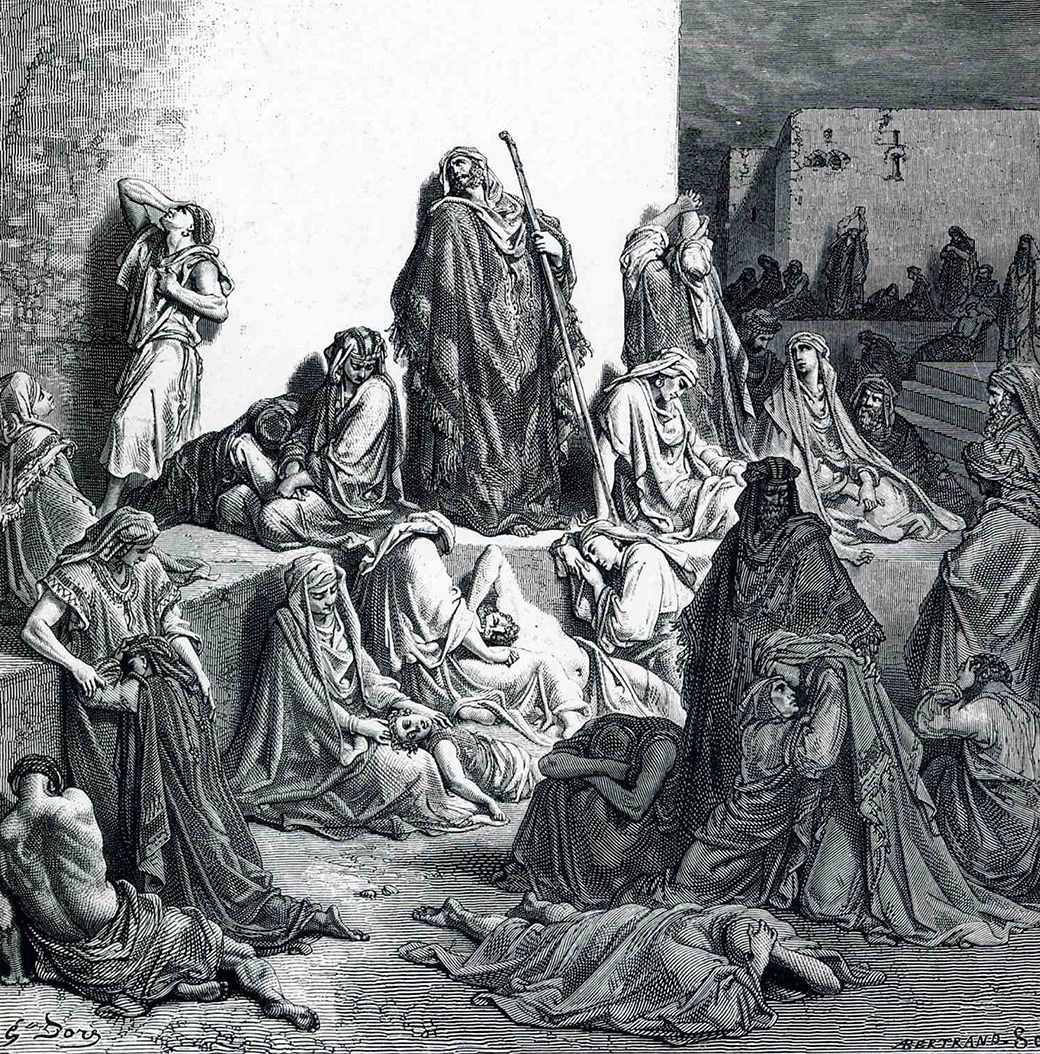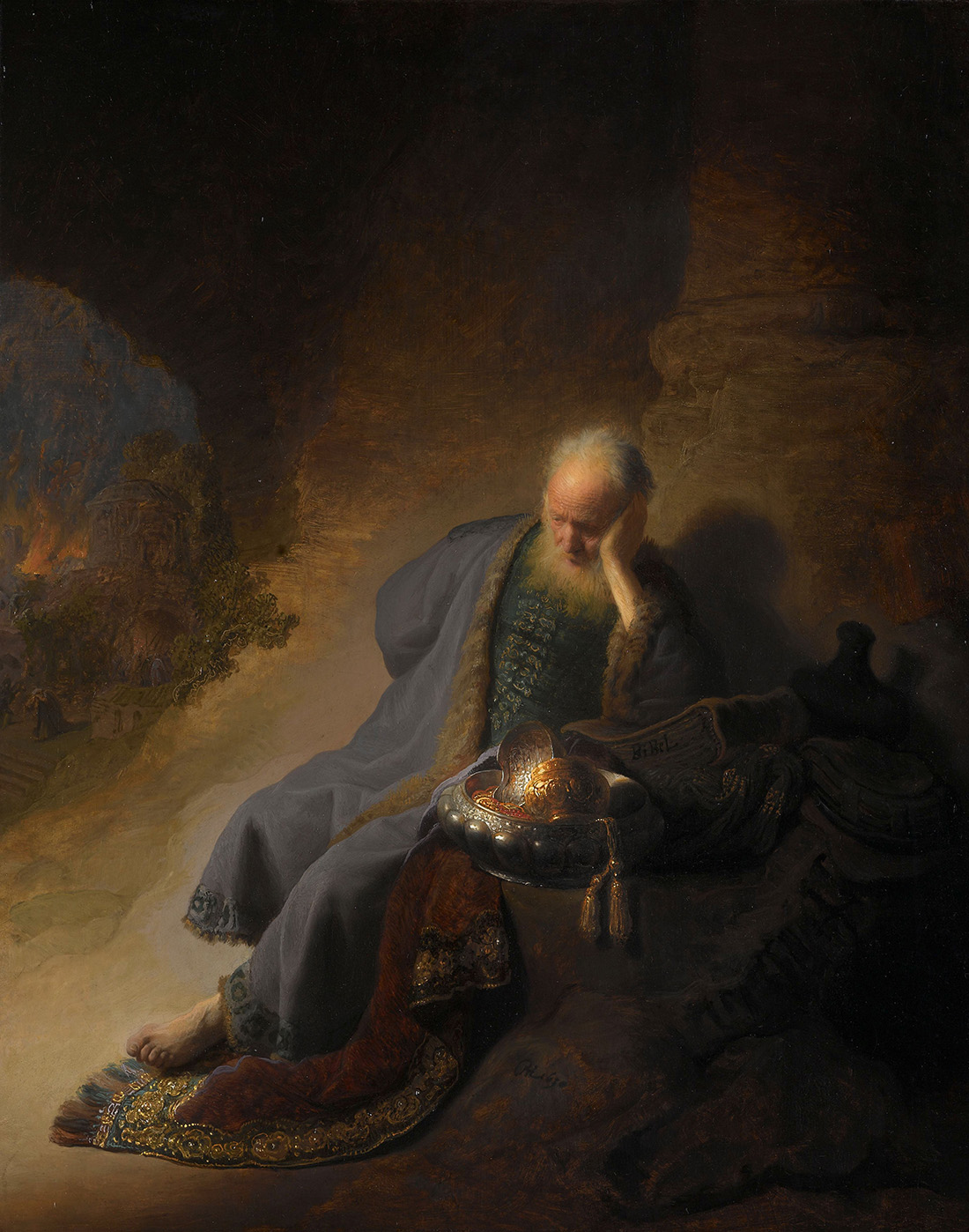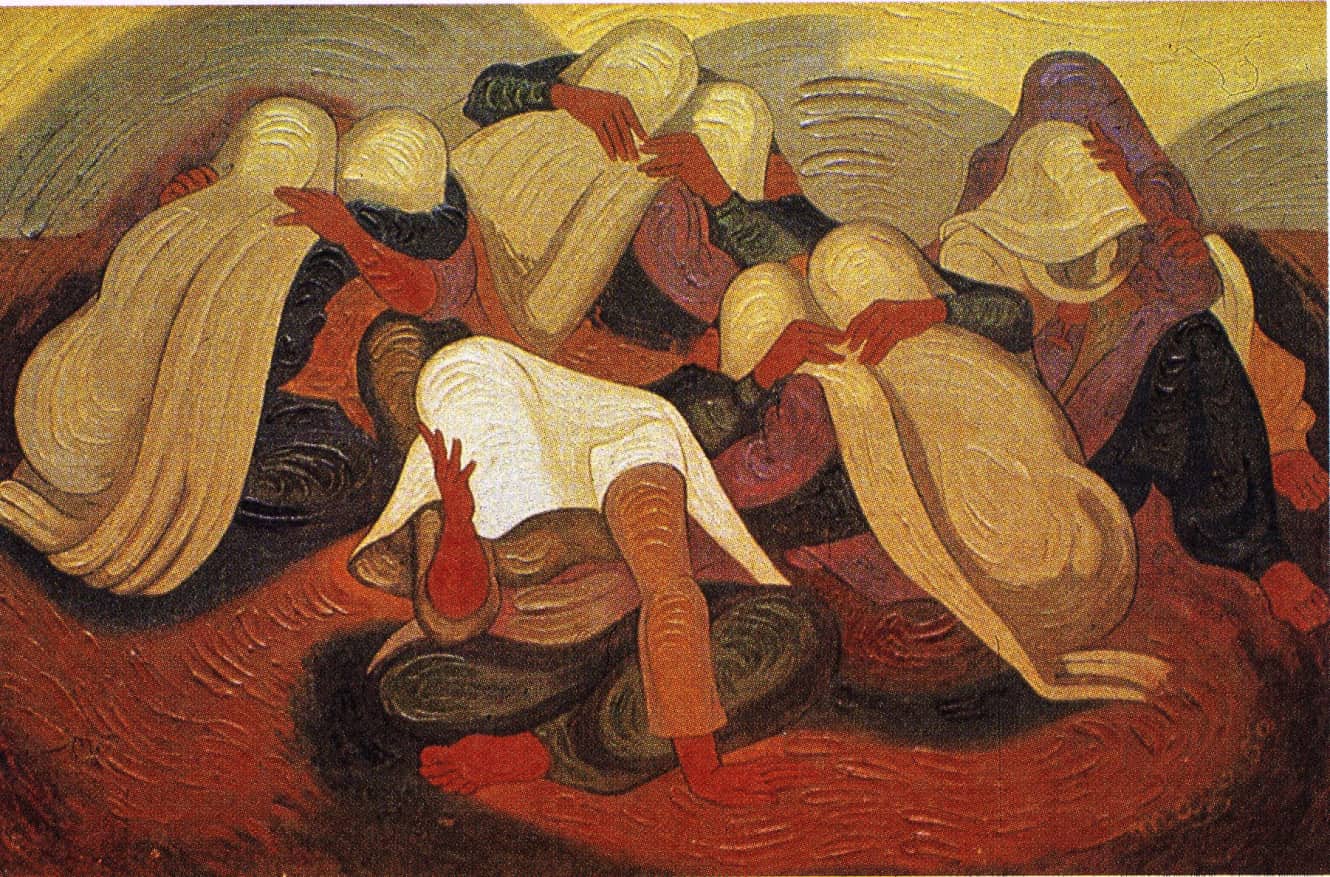Saturday of the 12th Week of Ordinary Time: Lamentations 2:2, 10-14, 18-19, Matthew 8:5-17.
Today’s readings combine a first reading from the seldom-used Book of Lamentations with what is for me one of the crucial texts for my experience of the Mass. They combine to shed even more light on the depth of the unearned generosity and mercy of God.
The Book of Lamentations is used exactly zero times for Sundays and major feasts in our Catholic Lectionary. A reading from Lamentations is an option for funeral masses, however, and selections appear 8 times over the three-year cycle during weekday masses. Today is one of those days.
I can imagine a few reasons why Lamentations is so seldom employed during the Mass. First, it’s a bit hard to take in. While poetically rich (four of the five chapters are acrostic, meaning they are structured according to the 22 letters of the Hebrew alphabet), the tone is undeniably bleak and coveys overwhelming suffering. Second, there is the question of how it fits into our experience as the Church of the Risen Lord. We live in an age that has the fullness of Christ revealed to it, where we can partake in the overflowing font of love from the Trinity that is the liturgy. How is this a time of lament? It’s really not.
But returning to the Book of Lamentations is important because it reveals not only our history but our present state as human beings. It underlines our desperate need for Christ in our lives. It helps us to appreciate the amazing gift the Father gave us in his Son, who took all of our sins upon his shoulders and on the cross, sacrificing them to the Father in order to take that burden from us. Where would we be without this unearned and undeserved gift? Well, let’s look at the Book of Lamentations!
What strikes me in today’s reading is the very personal nature of the Book of Lamentations: “Worn out from weeping are my eyes, within me all is in ferment; My gall is poured out on the ground.” Many (if not most) of us have experienced moments of weeping that have completely wiped us out emotionally and physically. That sense of your insides being in a knot, bubbling “in ferment,” is also something I can relate to. And the “gall poured out on the ground” is an interesting way to imagine the acidic vitality of our insides — that which helps us break down and in a way “lord over” the plants and animals that we ingest — being spent and wasted.

For the author (the Greek texts credit the prophet Jeremiah with the book even though the Hebrew texts do not), this very personal lament specifically references Jerusalem’s destruction and pillage by the Babylonians. His personhood is intimately tied up with being part of a Chosen People who have gone astray and now experience the seeming loss of their favor with God. He writes, “Cry out to the Lord; moan, O daughter Zion! Let your tears flow like a torrent day and night; Let there be no respite for you, no repose for your eyes.” The personification of Jerusalem as the daughter of the Lord is a particularly effective way to portray the suffering of the nation. The poet, the nation, and Jerusalem all cry together.
When I say that the Book of Lamentations is hard, there is another reason for the modern reader: God is portrayed in a way we’re increasingly uncomfortable with. Today’s reading starts: “The Lord has consumed without pity all the dwellings of Jacob; He has torn down in his anger the fortresses of daughter Judah; He has brought to the ground in dishonor her king and her princes.” God consumes without pity, he has anger, he brings low the leaders in dishonor. This is not the late 20th-century version of the God of Love who makes everyone feel good. But let’s pay attention, because this is not a different God, no matter how these words might stick in your throat. This is the God of Abraham, Moses, and Elijah, the Father of Jesus Christ, our God.
The way the author of Lamentations talks about God makes more sense if we place ourselves in the mind of true Jewish believers in God, people like Jeremiah. In their worldview, they know that everything comes from God. From success or loss on the battlefield to blessings or curses in life, everything comes from our personal relationship with God and the law He has given us. If we live according to His precepts, we eventually realize blessings. If we live our lives contrary to His Word, then we don’t know how or when, but there will be a consequence because evil and untruth simply cannot stand in God’s presence. Such consequences, such divine retribution, may not even come in a person’s lifetime — the Psalms have many passages where the psalmist bemoans the power and wealth that evil people amass and which seems to be unfairly bestowed upon them. But we don’t know God’s plan and can’t comprehend His relationship with time. Perhaps He is giving someone until the last seconds of their life to return to Him in their hearts. Perhaps He wants to provide a deeper lesson to us in the withering of the bad fruits that they have sown in the world. Who knows?

Today’s problem is that we think we know. Science, logic, and technology tell us that there’s practically nothing outside of our realm of knowledge and expertise. Modern commerce tells us that there’s nothing money can’t buy and get to you immediately. We satisfy all of our desires quicker and more thoroughly than ever before. To the modern mind, the notion that a divine power has ordered the universe in a way that we can’t know, we can’t change, and to which we must orient ourselves and be judged, well, that notion is deeply unsatisfying and must be rejected if we are to continue living in our comfort zone. It’s much easier to laugh off such a belief as superstition or the psychological neediness of weaker minds than it is to truly take the millennia of our faith tradition and God’s revelation in the world at face value.
To believe it, even for just a day, reveals the deeply troubling state of the modern mind.
But the writer of the Book of Lamentations believes it wholeheartedly. Not in a fake-it-till-you-make-it way, or even a “Lord, help me have faith in these hard ideas” way, but in a way that he knows from his toes to his gut that something is true. It’s the way I wake up and know I live in Utah. I conform myself to the laws and expectations of the state and I don’t spend my days questioning if Utah truly exists. The writer of Lamentations understands God in a way that we have yet to approach if we hold that seed of doubt in our minds, if we put any kind of limit on what our God might do, think, feel, or want.
So what does this crushed person who wrote Lamentations offer us? A taste of true faith, for one thing. And more: like Abraham, like Elijah, like Esther, and so many others, he offers us a way to comport ourselves when we realize that we have sinned and brought disaster upon ourselves, our people, and our Church. He writes, “Cry out to the Lord; moan, O daughter Zion! Let your tears flow like a torrent day and night; Let there be no respite for you, no repose for your eyes. … Pour out your heart like water in the presence of the Lord; Lift up your hands to him for the lives of your little ones Who faint from hunger at the corner of every street.” Is his point that we should always be ashamed and feel horrible? No, but that we should have true contrition (that is, sorrow for having offended God) and true repentance. What comes to mind for me is actually Christ’s beatitude, “Blessed are those who mourn, for they will be comforted” (Mt 5:4). God gives us mercy and comfort if we mourn our losses and our sins. Even moreso now, after Christ’s Paschal sacrifice, in the Sacraments of Penance and Eucharist. Perhaps He knew that we would become used to immediate gratification and needed something constantly available to lift us up. I particularly like the phrase to “pour out your heart like water in the presence of the Lord.” We are used to thinking of our hearts as being inviolably personal; someone might harm us but not touch our hearts; someone might think they know us but not know what’s deep in our heart. Medicine gives us 101 ways to monitor and care for our heart because, we are told, it is essential to life and to who we are. Now imagine pouring out everything in your heart like it was water — precious, yes — but freely flowing in the presence of the Lord. This is the appropriate way to look at ourselves and all we are, which comes solely from the Father and which amounts to but an infinitesimal speck in His presence.

Let’s turn to the gospel reading and the centurion’s response, which we repeat just before receiving the Eucharist at Mass. Jesus offers to go to the centurion’s house to cure his servant, but the centurion replies, “Lord, I am not worthy to have you enter under my roof; only say the word and my servant will be healed.” This is the same humility at the heart of the writer of Lamentations who, no matter his own personal purity, understands that he belongs to the chosen nation that betrayed God. Jew and Gentile alike know that they are fundamentally “not worthy” in the presence of God. More: Jesus, born of the line of David in this same nation of Chosen People, comes to extend salvation beyond the nation to the entire world. Here He brings healing to a Roman centurion, and being “not worthy” takes on an additional meaning for those of us not of Jewish descent who are being offered salvation. If we don’t think we’re that much of sinners (and good people honestly aren’t), then take for your model the saints who strove for perfection so they would be suitable to be in God’s presence. Better yet, take the ancient words of the psalmist: “Indeed, I was born guilty, a sinner when my mother conceived me” (Ps 51:5). We must have the humility to realize that even the best of us is but a child born into a world of sin and in need of God’s mercy and redemption.
Relative amounts of worthiness are meaningless to Christ. He offers healing and salvation to everyone, with a special focus on social outcasts to remind us that we are all equal children in God’s eyes. He desires personal purity and adherence to God’s law, but more so, in the words of the psalmist, a contrite heart: “The sacrifice acceptable to God is a broken spirit; a broken and contrite heart, O God, you will not despise” (Ps 51:17). Is this not a suitable description of the writer of the Book of Lamentations: a broken spirit, a broken and contrite heart?
We might ask, why a broken spirit, a broken heart? Many theologists have written on this topic, but a simple answer might be that the only way to overcome our original sin of betraying God’s trust by desiring to have His knowledge is to break that spirit of defiance and pride in ourselves. Perhaps God wishes for us to go through an amount of suffering that breaks our spirit of selfishness so that He can draw us to Himself and rebuild us in His image.
And how interesting that we get a military analogy from the centurion in today’s reading. As most military systems work, the Roman one included, troops must learn early on to leave behind their own desires and thinking in order to follow commands unquestioningly. A good military could never have each person down the line of command questioning the orders from his or her superior. The centurion brings his broken and re-formed spirit to Christ. He explains that “I too am a man subject to authority … I say to one, ‘Go,’ and he goes; and to another, ‘Come here,’ and he comes.” This life experience helps the centurion believe unquestioningly that if Jesus commands the servant to be healed, he will be healed. He pairs this with his own humility (which is itself a contrite heart for the sins of humanity) when he says, “Lord, I am not worthy to have you enter under my roof.”
This broken spirit and contrite heart God indeed does not despise. “When Jesus heard this, he was amazed and said to those following him, ‘Amen, I say to you, in no one in Israel have I found such faith.'” Christ, energized by the faith shown Him by the centurion, goes on directly to heal Peter’s mother-in-law and many others brought to Him that evening.

There are so many lessons for us in these readings. One is the insistence on a conversion of heart as our way to God. Even this phrase is misleading because “conversion” may imply that we are the authors of the action. By conversion of heart, we must understand that what we do is simply break ourselves away from the comfort zone of thinking we’ve got it all figured out and can do it on our own. God gives us endless opportunities to reach this point of a broken spirit, whether the death of a loved one, a lost job, a sickness, or what have you. After this, we must be contrite primarily for our hubris in thinking that we exist without God and have the power to control the world and our own destinies. Secondarily, we must be contrite for the actual sins we may have committed against God and our fellow human beings. Finally, we must offer this all to God, our hearts pouring out like water, and beg for his mercy. Then, the real conversion is out of our hands and in His. He has given us His Son and the Holy Spirit to fashion us into beings better than anything we could be on our own. We can be beings of light and charity in this broken world, but only if we acknowledge and give to Him the power and control of our lives.
Now, certainly living by God’s law and precepts is important, but without a truly broken spirit and contrite heart, being a rule-follower is nothing more than that. God wants our entire selves, and this starts with humbling ourselves before Him, not just ticking off the things we did according to the law.
This brings me to a final point that I feel compelled to make. There is a current debate today as we try to avoid spreading COVID-19 in our churches: should we stop receiving the Eucharist on the tongue because of hygiene/saliva/respiratory droplet concerns? On the public health side of things, the evidence clearly points to this being risky in terms of spreading the virus. Yet I have encountered some parishioners in our church who have boycotted receiving communion because of this. One of them explained in a heated manner that it is not OK to receive the Eucharist in our hands because our hands are not consecrated like the priest’s hands are (indeed, there is strong support from the Doctors of the Church on this point, namely St. Thomas Aquinas and others). In other words, we sully the purity of the Eucharist by touching it with our hands. The claim is that the only way to receive the Eucharist cleanly and with appropriate reverence is to have it placed directly on our tongues so we can ingest it right away. This person was particularly concerned with the loss of reverence in the modern Catholic Church, which many people ascribe to standing and receiving Eucharist in the hand instead of kneeling and receiving on the tongue.
I’ve investigated this issue a bit and the Church herself has vacillated on this topic. There is no mention of receiving Eucharist on the tongue in the New Testament (notably not in the Last Supper). We can reasonably guess that receiving a piece of bread at a meal was done by hand, even during the liturgy when the bread has been consecrated and become the Body of Christ. We have St. Cyril of Jerusalem clearly instructing catechists in 350 AD, “When thou goest to receive communion go not with thy wrists extended, nor with thy fingers separated, but placing thy left hand as a throne for thy right, which is to receive so great a King, and in the hollow of the palm receive the body of Christ, saying, Amen” (Catechesis Mystagogica V, xxi-xxii, Migne Patrologia Graeca 33). Some opponents of Eucharist-by-hand point to the Council of Saragossa (380 AD) and Synod of Toledo (400 AD), which threatened excommunication for taking the Eucharist by the hand, but these regional (Iberian Penninsula) meetings were convened specifically to counter the Gnostic-Manichean heresy known as Priscillianism wherein people took the Eucharist out of the church and ate it later. Nonetheless, the practice went out of style, presumably out of a desire for reverence for the Real Presence, and by the 3rd Council of Constantinople (680 AD), it was formally forbidden by the Church to receive the Eucharist in the hand.

But after Vatican II, bishops around the world began accepting this once again as a valid form of receiving the Eucharist, including the bishops in the U.S. in 1977. Today, according to The General Instruction of the Roman Missal, “the consecrated host may be received either on the tongue or in the hand at the discretion of each communicant. When Holy Communion is received under both kinds, the sign of reverence is also made before receiving the Precious Blood” (160).
So, by boycotting Eucharist-by-hand, these parishioners are making a political statement that contemporary, Church-sanctioned practice is not valid. That is a problem in itself, and I don’t welcome this type of act in the Holy Liturgy. The liturgy is for the faithful to commune with God, and as the Catechism of the Catholic Church (CCC) states: “It is in keeping with the very meaning of the Eucharist that the faithful, if they have the required dispositions, receive communion when they participate in the Mass” (1187). Moreover, such a boycott of Eucharist-by-hand shows either an ignorance of or willful defiance of the great movement of the Mass as outlined to wonderfully in the CCC (1348-1355). Our Eucharistic celebration of the Mass at the dual tables of the Word and the Body has a logical as well as a mystical arc that helps us give appropriate prayer and preparation throughout the liturgical celebration, the summit of which is feeding ourselves with the Bread of Life. To take the analogy used by Christ and the apostles, not taking the Eucharist as offered to you by the priest and sanctioned by your bishop is like showing up as the bride to your own wedding, going through all the preparations and the entire ritual only to refuse to say your vows to your bridegroom, who in this case literally is Christ Himself!
Ironically, this politicization of the form of reception of the Eucharist ends up being one of the more irreverent acts one can imagine, yet done in the name of demanding more reverence. While I absolutely agree that a deep sense of reverence is often lacking in our modern Church, I think it is far too simplistic to point to one specific ritualistic practice at the pinnacle of the Mass as the culprit. As mentioned above, that sense of reverence and focus on the Lord should be present from the beginning, the gathering, and all throughout the great liturgical celebration where we get to behold our Lord in Word and Body. The entire movement of the Mass demands our full participation — this does not diminish the value of the Eucharist but only accentuates it as we prepare ourselves in great anticipation for the meal.

But perhaps my greatest sadness over this act by some parishioners is something that we are clearly hearing in today’s readings. From Lamentations: “Let your tears flow like a torrent” and “Pour out your heart like water in the presence of the Lord.” Our reflection on the psalmist’s insistence that the Lord is most pleased by a broken and contrite heart, that is, our humility and willingness to be shaped by Him. And the centurion’s words that we repeat to this day: “Lord, I am not worthy to have you enter under my roof; only say the word and my servant [soul] will be healed.” The whole point here is that of course we’re not worthy of His grace, much less His very Body and Blood. Our hands are not worthy to touch the Eucharist but neither is our mouth! It is all a gift and beyond us to grant a greater or lesser measure of purity on one body part or another. Jesus accepts the sinner and prostitute as wholly as the pious person. What He asks of us is a broken and contrite heart, open to Him, a conversion of self that allows Him to pour His love in our hearts. Where is the broken and contrite heart in the act of boycotting taking the Eucharist in your hands? Where is the humility to gratefully accept what the Lord is giving you? He has been teaching us patiently for millennia the Way to the Father, and yet here we are fetishizing parts of ritual purity just as ridiculously as the Pharisees He criticized in His time on earth.
My prayer for the Church and its members is that we all take to heart the lessons provided to us and we approach the Lord with the supplication, thanks, and humility that will lead us to greater and greater union with Him.
Like!! Great article post.Really thank you! Really Cool.